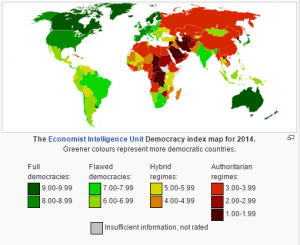
Economist Intelligence Unit World Democracy Index (2014) via Wikipedia.
I don’t regularly read The Huffington Post or Slate, but in the last few weeks a USian friend has sent me a series of links to increasingly egregious examples of apologists for Islam on their websites. There is not doubt that especially in OECD countries, Muslims are increasingly adopting the Enlightenment values that many theists like Christians and Jews already have. There can also be no doubt that this is a positive development for humanity. All international indices show that those countries most steeped in Enlightenment values are also the most successful on every level whether we look at wealth, economic freedom, peace, openness, women’s rights, LGBT rights, democracy, support of the disadvantaged, or anything else.
However, this process is being interrupted for Muslims in the OECD in two ways. Firstly, there are those on the left who apply the bigotry of lowered expectations. Their reasoning is that criticism of Islam the religion is the same as criticizing all people who are Muslim. Despite the fact that there are around 1.6 billion Muslims on the planet they seem to see them as some amorphous lump to which generalizations of all kinds can be applied. Their standard comment of “nothing to do with Islam” whenever an act of terrorism is committed by extremists who are members of the religion, for example, is what leads to the second problem: anti-Muslim bigotry.
The fact is that all the negative things that people say about Islam are as real as the positive aspects of the religion and denying them is counter-productive. Whether it’s jihadi Islamists committing acts of terror or Shari’a councils operating within Muslim communities in Britain that sometimes produce verdicts that don’t treat women as equals, the problems do have something to do with Islam. When people say it doesn’t, it denigrates and depreciates the work of those Muslims who are trying to make their religion more open, tolerant, respecting of difference, and secular.
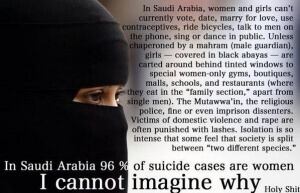 We are, for example, told over and over again by the apologists how much women are respected in Islam and that any comments to the contrary are blatant Islamophobia. Of course, there are many Muslim men who respect women and treat them as equals, but the religion itself cannot make the same claim. Women who do not wear hijab or worse, a burqa or niqab, are often made to feel they are not properly modest and are letting their religion down by both men and other women. The Qur’an mandates that women receive a lesser inheritance than men, and the way the hadiths are interpreted in several jurisdictions means it is virtually impossible for a woman to even accuse a man of rape and if she does, she is often prosecuted for a “crime” such as being out without a suitable male escort.
We are, for example, told over and over again by the apologists how much women are respected in Islam and that any comments to the contrary are blatant Islamophobia. Of course, there are many Muslim men who respect women and treat them as equals, but the religion itself cannot make the same claim. Women who do not wear hijab or worse, a burqa or niqab, are often made to feel they are not properly modest and are letting their religion down by both men and other women. The Qur’an mandates that women receive a lesser inheritance than men, and the way the hadiths are interpreted in several jurisdictions means it is virtually impossible for a woman to even accuse a man of rape and if she does, she is often prosecuted for a “crime” such as being out without a suitable male escort.
Last week MEMRI released a clip from a show that broadcast on Palestine TV on 19 May 2016. In it Mazen Sabbah, an Islamic Law professor from Palestine, is discussing a recently released report about polygamy. In Palestine polygamy is legal for men but only with the permission of the current wife or wives. A women is allowed to divorce her husband on the grounds that he married another woman without her permission. A man is required to treat all his wives equally (though a 2005 survey by the Palestinian Central Bureau of Statistics found that “23.3% of women who had ever been married reported that they had been exposed to physical violence, 61.7% to psychological violence, and 10% to sexual violence).” They are also required to provide all wives with separate dwellings, which is often done by the different families sharing a compound or central courtyard. The report being discussed in the clip suggests that women shouldn’t be able to prevent their husbands from marrying another wife. Professor Sabbah explains why (and prepare to be disgusted):
Full transcript (via MEMRI):
Mazen Sabbah: Sometimes a man needs more than one wife.
Interviewer: Of course.
Mazen Sabbah: If he is told that this is illegal and that he must make do with one, this might lead him to leave home, take mistresses, and act in a despicable manner. This would cause him harm.
Interviewer: That’s why he should take another wife.
Mazen Sabbah: This would cause harm to him, to his family, to his wife, and to society. According to the principle of jurisprudence, harmful things must be avoided. How should it be avoided? By permitting polygamy. […]
Women are held in high esteem, but are you and the viewers aware that the husband has the right to forbid his wife from going out to work? Islam permits her to work – in keeping with some restrictions – but a husband may waive [his right] to keep her at home in favor of her going to work, because there is a strong bond between the couple, and together they are building their common life.
Interviewer: Right. […] In the report, we have seen the view that the woman is primarily responsible for her husband taking another wife. Let’s talk about how the wife should behave to create a pleasant and peaceful atmosphere at home, in order to prevent her husband from marrying another wife.
Mazen Sabbah: The home is a kingdom, and the wife is its queen. It is necessary for her to run the home well. [The hadith says]: “Each of you is a shepherd, and each of you is responsible for his flock.” The woman is shepherd of her husband’s home. One of the basic things that a woman must understand is to bear her responsibilities, as well as to bring happiness. The woman is the key to happiness and the key to misery. She can either bring her husband happiness or cause him misery. She can do it by means of a good word. She may be lacking in beauty, yet be adept in making her husband happy, in making the home a happy place, and in educating her children. On the other hand, she might be of outstanding beauty, yet unable to make her husband happy, in which case he may marry a second wife, of lesser beauty but with whom he is happy. Why? Because he receives a good word from her, a pleasant attitude, happiness, and joy. […]
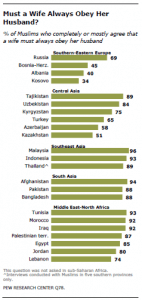 So because a man is having difficulty remaining sexually faithful, which is his wife’s fault, he should be allowed to marry an extra wife in order to prevent him committing the sin of adultery. An affair would cause him religious harm, so to be a good wife and fulfil the role Allah assigned to her, she should allow her husband to add a wife to his collection, no matter her own feelings.
So because a man is having difficulty remaining sexually faithful, which is his wife’s fault, he should be allowed to marry an extra wife in order to prevent him committing the sin of adultery. An affair would cause him religious harm, so to be a good wife and fulfil the role Allah assigned to her, she should allow her husband to add a wife to his collection, no matter her own feelings.
This professor clearly does not, because of his religious views, consider women to have equal rights to men. There is no talk of a relationship being a joint responsibility with each person working at it for the enrichment of the lives of both. He is probably unable to even consider that he might prefer a more equal relationship with his wife. The attitudes displayed here are not acceptable in a society where men and women are equals.
And no-one ever considers that if it’s okay for a man to have more than one wife, it’s okay for a woman to have more than one husband. (Except for the Denobulan Dr Phlox in the TV series Star Trek: Enterprise. 🙂 )
The interpretation of Islam displayed in the video is unfortunately still the majority one within the religion – that the primary role of women is to make men happy. There are Muslims who are trying to reform their religion, but too many of them simply don’t know any other way to behave. Men and women have been brought up to take certain roles in their society and it does not even occur to them to act differently. The result of this was seen in such infamous episodes as the sexual attacks on women in Cologne, Germany at New Year.
Muslim women who live in countries where they are not equal under the law are being let down every day by my fellow liberals who do not call out those Muslim men who do not treat women equally. I posted the Jesus and Mo cartoon below in a recent post and even when I spelled out that there was a point in including that cartoon, there were some amongst the regressive left who missed it entirely. Just to make it clear, it is the trump line in the final panel: “Besides it’s not really discrimination if it’s against chicks.”
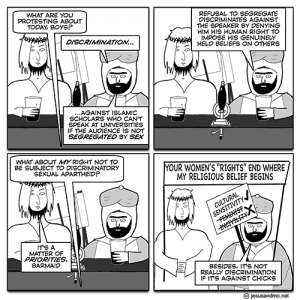
Because this is an attitude that I’ve seen time and again amongst the regressive left. They’re so busy trying to show that they’re not racist by being inclusive of Muslims (even though Islam isn’t a race) that they fail those within Islam who are suffering every day because of that religion – most obviously women and LGBT people. We even saw the ridiculous situation at Goldsmith University where former Muslim Maryam Namazie’s talk was opposed by the University’s Islamic Society, and the Feminist and LGBT groups came out in support of the Islamic Society! Namazie’s reasons for leaving her religion include its treatment of women and LGBT people in law. However her apostasy and frequent harsh words opposing political Islam have seen her labelled an Islamophobe by many and that’s enough for some regressive liberals to try to stop her speaking, which they have succeeded in doing in some cases. (To be fair, some Muslim groups who have labelled her an Islamophobe nevertheless do NOT support bans on her speaking.)
One of the articles my aforementioned friend referred me to was ‘5 Common Stereotypes About Muslims, Debunked‘ by Kareeda Kabir in The Huffington Post. It was clear where the article was going from the start. From the first paragraph the author declared her distress that the attacks in Nice, France on Bastille Day, and Würzburg, Germany four days later, were labelled “terrorist attacks.” She was watching the Nice events unfold over social media and I watched via television, but at no time did the media I was watching, some of it right-wing, make any assumptions about what was happening. But we need to look at the words that are missing so far in this paragraph – “Muslim” and “Islamist.” Because even Ms Kabir didn’t comment that she saw anything that connected the attacks to Muslims specifically – she seems to have made that assumption herself simply because of the word “terrorist.” She herself is the one that applied that bigotry of low expectations.
She went on to outline five ways in which she says people stereotype Muslims. In my experience, it is only the most ignorant on the far-right who hold the stereotypes that she outlines: that all Muslims hate Jews and Christians, that they also hate LBGTQ people, that they don’t believe in God or Jesus, that they wear turbans, and that Islam promotes groups like ISIS and Al Qaeda. With the partial exception of the last one, most non-Muslims don’t believe these things, and the reason some believe the last one is the fault of those whose constant refrain is, “It has nothing to do with Islam.”
The regressive left complains that prominent New Atheists like Sam Harris, Bill Maher and, before his death, Christopher Hitchens, focus on that part of the Islamic faith that encourages or at least supports Islamist jihadists. They suggest that they are providing fodder for right-wing bigots like Donald Trump, Nigel Farage, and Marine Le Pen. But New Atheists always differentiate between Islam and individual Muslims and never make sweeping generalizations about members of a whole religion. On the contrary, the ones that are creating the problem are those that say, “It has nothing to do with Islam.”
 Both Muslim and regressive leftist apologists for Islam trot out the “nothing to do with Islam” trope. As Maajid Nawaz points out above, it actually does have something to do with Islam and denying that creates an environment where the religion doesn’t need to own the issue and move forward. Those who are trying to reform Islam from within are thus abandoned, along with those who are suffering and whom liberals should be supporting in their fight for equality – women, LGBTQ people (including LGBTQ Muslims), cultural but apostate Muslims, and non-Muslims living in countries where that status makes them second-class citizens.
Both Muslim and regressive leftist apologists for Islam trot out the “nothing to do with Islam” trope. As Maajid Nawaz points out above, it actually does have something to do with Islam and denying that creates an environment where the religion doesn’t need to own the issue and move forward. Those who are trying to reform Islam from within are thus abandoned, along with those who are suffering and whom liberals should be supporting in their fight for equality – women, LGBTQ people (including LGBTQ Muslims), cultural but apostate Muslims, and non-Muslims living in countries where that status makes them second-class citizens.
Because it is an issue that in several Muslim-majority countries being homosexual makes you guilty of an offence punishable by death. (It really is a good thing no one has yet identified a “gay gene” or some of those countries would likely be at least considering state-sponsored infanticide.) Atheism is also illegal in several countries governed by Shari’a and punishable by death in thirteen of them. Apostasy too, whether to atheism or another religion, is, or is widely considered to be, something that is punishable by death in several countries.
On the far right, denying none of this has anything to do with Islam just pisses people off. It is obviously not true and as is often the way with extremists, in denying that it has nothing to do with Islam they take the position that it has everything to do with Islam. At that point ridiculous and discriminatory policy positions like Donald Trump’s ban on Muslims begin to look reasonable by a certain portion of the population.
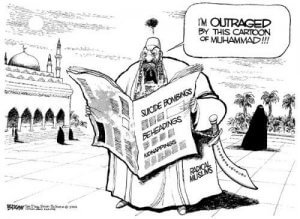 Islam needs to be treated exactly the same way we treat every other religion, and religion should he treated in the way we treat every other idea. It should be fully open to discussion, criticism, and praise. As a society, there is already a certain deference given to religious ideas that isn’t given to other ideas; when “closely held beliefs” are religious many think that should give them special status. If a person’s “closely held beliefs” were racist, for example, no one would consider the same. But even amongst religious ideas many hold the view that Islam should not be subjected to the same standards. The result of this is that right-wing Muslims think killing someone for drawing a cartoon is a perfectly acceptable reaction, the regressive left make excuses for the reaction, and right-wing conservative Christians, most of whom have probably never met a Muslim in their life, consider all Muslims Public Enemy Number One.
Islam needs to be treated exactly the same way we treat every other religion, and religion should he treated in the way we treat every other idea. It should be fully open to discussion, criticism, and praise. As a society, there is already a certain deference given to religious ideas that isn’t given to other ideas; when “closely held beliefs” are religious many think that should give them special status. If a person’s “closely held beliefs” were racist, for example, no one would consider the same. But even amongst religious ideas many hold the view that Islam should not be subjected to the same standards. The result of this is that right-wing Muslims think killing someone for drawing a cartoon is a perfectly acceptable reaction, the regressive left make excuses for the reaction, and right-wing conservative Christians, most of whom have probably never met a Muslim in their life, consider all Muslims Public Enemy Number One.
It’s time for everyone to start acknowledging that Islam is part of the problem. That is the best way for the religion itself to move forward and to undercut the growing anti-Muslim bigotry coming from the far-right.
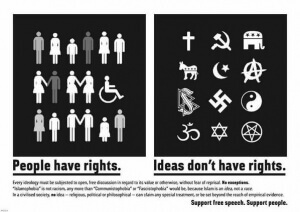

Excellent post, Heather. From what I’ve seen, such objections usually take the form not of directly criticizing specific statements, but of vaguely implying that something bad will happen if people mention Islam in relation to Islamic terrorist groups. (Or of course simply accusing someone of racism or bigotry and then demanding they disprove it.)
But among the reasons it is important to include Islam/religion in these discussions is because this religion is an essential part of the territory that makes up the recruiting ground for extremists. Religion — as any priest or holy man knows — grants automatic authority to those speaking in its name. To politely bow out of that discussion immediately cedes territory to recruiters.
The non-existence of gods and heavens and hells should be far more openly spoken of in public, and the hollowness of assertions of their existence should be routinely pointed out and those who refuse to concede their ignorance deserve to be mocked and ridiculed.
(Obviously, respecting religious freedom as a human right is entirely compatible, indeed essential to this.)
Thanks Yakaru, and I agree with your added points too. My post obviously doesn’t go far enough (as Ken also notes) but I wanted to start by largely keeping the murder by both sides out of the conversation. It’d be nice if we could at least agree that Islam must be part of the conversation when looking at what’s causing the problem as well as finding solutions. There are things about Islam that are different to other religions that are making solving the problem more difficult.
Most of Germany has moved on from Nazism, for example, and Italy and Spain from fascism, and the fact the allies killed millions of their compatriots doesn’t stop us being the closest of allies now. NZ, Aus, Canada and the US also have close relationships with Japan and have done for a long time despite the ongoing issues they suffer because of the bombs dropped on Hiroshima and Nagasaki. There are many examples where nations have moved forward despite what they have done to one another.
Also, as a NZer, where we’ve not so far been directly affected by Islamist terrorism (although my brother was living in Manhattan and working on Wall St at the time of 9/11), my personal concern is my lifelong one of women’s and children’s rights and, once I became aware of them, LGBTQ rights. Even when I was still a (Christian) child I was extremely critical of all religions for their stance in these areas so it’s sort of my fall back position.
In this case Islam forms an essential and unavoidable part of the conversation as it is the unifying element that transcends borders and makes self-starters to feel connected to ISIS. And obviously, God is the ultimate authority who gives permission for people to ignore their conscience, Milgram-style.
Hopefully, we’re not about to go around the same circle once again, but there is no single “unifying element that transcends borders and makes self-starters to feel connected to ISIS”. Indeed, there is plenty of evidence that many who decide to fight for ISIS have little connection to or understanding or Islam and are more motivated by other factors.
And we’ve also discussed before that understanding Islam has nothing to do with level of fervour. We know from surveys that atheists know more about religion than any Christian demographic.
The initial separation from mainstream society often comes from other issues – economic, social, psychological, political, criminal etc – and then those young men (because it’s usually men, though in France in particular a lot are women) are given a reason to feel important by extremists who take advantage of them. It is extremist Islam (Islamism) that has a theology that calls for the murder or the out-group, including the celebration of death in committing that murder. This must be addressed.
Yup, the only question is how. I maintain the only credible way is to concentrate mostly on the many things that contribute to the maintenance of this environment that are in our control and less on those things that depend on others. Not only would it be the most effective approach, but also the moral one, and also the thing that provides the best chance of enabling the desired religious reform.
I agree we need to concentrate on the things we can change, but I consider that includes supporting people and groups that are doing their best to reform Islam from within. If we continue to pussyfoot around criticizing the bad stuff in Islam we are, in my opinion, passively supporting the Islamists.
I wasn’t trying to repeat any further discussions, but rather, perhaps too vaguely, hinting at the general idea of God (how ever defined by the perps) becomes — as in Milgram’s experiments — an enabling authority. In other words, that regardless of motivations, God is the essential element that encourages people to overrule whatever conscience they may have.
Ok, except that god isn’t “the essential element” here either, even if a big one. Ends have been justifying means without reference to religion for ever.
Heather, I mostly agree, though believe some nuance is required in application. Channeling Paxton, the context is critical to what outcomes actually eventuate. Dawkins says he wouldn’t challenge a believer after the death of a loved one, as while his points would be no less true, in that context they would do only harm.
Now the situation here is not so straightforward as that, but when, after the West has taken part in the deaths of millions of Muslims, a dominant narrative denies this, claiming instead that Islam is the cause of too much violence, often leading to calls for even more discrimination and violence against Muslims, people need to be damn careful they don’t pour petrol on the flames, even when just telling the truth with good intent. As I said once before, if I was publishing content, “I would be tempted to write a standard disclaimer to be displayed at the beginning of each post, stating briefly but clearly that whatever it’s myriad problems, Islam is not the main cause of terrorism and that if the West really wants to reduce violence, it should start by reducing its own. Shouldn’t have to do this, but there are so many right-wing assholes around, and many prominent liberals don’t have enough of a clue either.”
I still think that good advice.
You make a good point, and disclaimers certainly have their place. I also think the issue is a reason for more conversation though. Trump and his acolytes get away with their over-generalizations because so many of the people listening to them are ignorant about both their own country’s foreign policy and Islam. In NZ we’re just not as vulnerable these days to his sort of rhetoric, though we have been in the past. We have Winston Peters, but just this morning on Q & A when someone used him as an example the response was something like, “Yeah, but he’s been moaning about immigrants for 40 years,” and thus his comments were largely dismissed. The NZ electorate is fairly knowledgeable in comparison with, for example the US one. Also, politicians are expected to tell the truth and to keep their election promises, and the media is expected to be fair. We’re very lucky.
Heather, as I’ve never denied Islam is part of the problem, I haven’t much issue with the facts presented here, or that they are being presented. But I don’t think any analysis is complete that ignores the impact of state violence against Muslim countries. Islam is not going to go through a reformation while radicalism is being encouraged by Western foreign policy. The biggest thing we secularists can do isn’t to complain about Islam, though it surely deserves to be criticised, but to help create a climate where reform can occur, rather than the one we have now that makes it nearly impossible.
Likewise, I would have no problem with Sam Harris, if he didn’t pretend this wasn’t the case. That his clash of civilisations trope is getting ever more shrill, is not only a gross distortion of reality, but absolutely does feed racist animosity toward Muslims. Until he gets the balance right, he should be opposed.
Muslims are not a race. Humans are a race.
Humans are not a race either. Humans are a species.
Substitute anti-Muslim bigotry if that helps.
Well, I see ‘Islam’ and ‘Christianity’ as competing ‘imperialist/colonialist’ ideologies throughout their histories. The fact that Islam generally came off somewhat second best over the last (very) few centuries is – I think- mainly due to the technological and industrial revolutions that took place in the predominantly ‘Christian’ West.
In the West Christianity has largely been tamed by the Enlightenment, while Islam has not.
I think that the recent ‘Enlightenment enhanced’ (and often Christianity defying) success of the ‘West’ in science, technology, economy and -not least – warfare, has created a lot of resentment in the Islamic world.
The flight into fundamentalism is but one of possible -and actual- reactions. Another is/would be an Islamic enlightenment.
In other words, to consider Islam as non-imperialist/colonialist/patriarchal etc. (and even more so than ‘naked Christianity’) is not compatible with the data and is not contributive to the betterment of humankind.
Great post Heather!
There are a few things that makes Christianity just slightly more palatable to me than Islam.
The mythical Jesus washing the feet of a prostitute and telling this was the example to follow (I’d love to see Pence or Cruz doing just that). And of course the fourth century fabrication: “Who is without sin throwest the first stone’. One would nearly consider becoming a Christian! 🙂
Much less of that in the Islamic Trilogy. Eg. When Umayr asked the (only slightly less mythical) Prophet if he was wrong to have killed -by stabbing through the heart (with a child at her breast, nogal) – that woman who mocked him, he answered with: who cares about two goats nudging each other.
Agreed, all this is thin, but still.
I agree. The Golden Rule: Treat others as you would like to be treated is another one that everyone can agree with I think. I don’t think there’s any such thing as a good religion, and cherry picking is required, but there is stuff there. In Islam even the good stuff often means something completely different when you know the context.
The Golden Rule should indeed be universal, but often it applies only to the in-group. Religion (and the monotheistic religions stand out with a little star there) is a typical instrument of creating an in-group wider than your own extended family or local tribe.
So no, I respectfully disagree with you here, not “everyone can agree with” the Golden Rule. Pertinently so if it would imply that it applies outside of the particular circle. [Not to mention different rules for males and females, even within the in-group]
I agree with your points. However, if someone isn’t applying the Golden Rule universally, I don’t consider them to be applying it. Universal application is a prerequisite to say you use it as far as I’m concerned.
Of course, originally it only meant other Jews, not Gentiles, so it’s not as good as it sounds when it’s cherry-picked from the Bible as a good bit – as always, context matters.
Slightly off topic, those bearded men holding placards “Slay those who insult Islam”, “Behead those who insult Islam”, ” Butcher those who mock Islam” are direct;y inciting to murder – this inciting is a crime-, far beyond the boundaries of ‘hate speech’. And we know these threats are definitely not rhetorical. These guys should be facing trial in court, serve in prison and/or be deported. It should be dealt with swiftly and decisively.
The reluctance of European governments (I suppose it is in Europe, if not, it is common there at any rate) to act upon these crimes is what feeds the extreme right there (compared to which Trump is a silver-spooned piece of cotton-wool).
Yeah – those pics usually come from Britain, though some are from former British colonies like Pakistan and Bangladesh. And there is a reluctance to prosecute them in Britain which has caused a lot of issues. The Rotheram scandal is a direct result of that reluctance and feeds the narrative of parties like UKIP.
Tolerant is good. However, there is a danger that people are so careful to be tolerant that they won’t even let themselves imagine that someone who is different from them might have bad intentions. They tend to assume they’re just being, for example, racist, or don’t want to be seen as having that prejudice. They seem to forget that every demographic has its share of goodies and baddies.
I agree that every ‘demographic’ has its share of goodies and baddies, but among the Muslim youth (and a few older ones) in Europe there is a strong sense of disrespect and loathing. Indeed, as you point out, they take advantage of the tolerance: they see it as weakness. They consider European democracy decadent and filthy, they despise it, basically because these societies and their populations are not muslim. Hence fair game for any treatment. And they hate it because these societies are kind of successful.
[Lest that sounds a bit generalising, it obviously is, but this attitude is not exactly fringe either.]
I fully agree with you we should support the voices of enlightenment within Islam, and the ‘apostates’ even more…